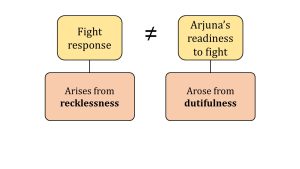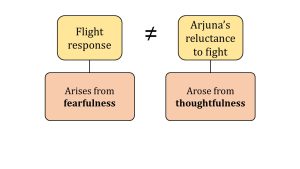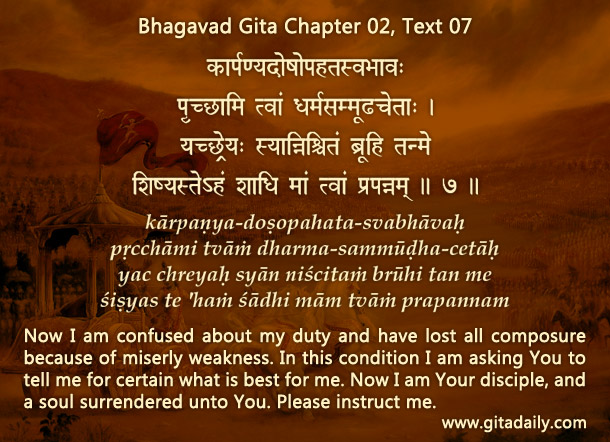

When we encounter something unfamiliar, we often try to make sense of it by placing it in some familiar conceptual framework. Using such an approach, some people treat Arjuna’s actions in the Bhagavad-gita’s first chapter as exhibitions of the fight-flight response.
What is the fight-or-flight response? A psychological concept which suggests that we react to difficult or dangerous situations with two typical responses: fight, wherein we race into the confrontation, fantasizing that we will crush any opposition; or flight, wherein we race away from the confrontation, fearing that the opposition will crush us. Arjuna’s actions on the Kurukshetra battlefield might seem similar: he was initially ready to fight, subsequently reluctant.
But was Arjuna’s initial readiness to fight driven by impulsive recklessness? No, it arose from his dutifulness. He was a kshatriya (martial guardian of society) by both disposition and position — it was his responsibility to protect society from aggressors, using force when necessary.
More importantly, was his subsequent reluctance to fight driven by impulsive fearfulness? No, as can be inferred from both his words and actions. While articulating the rationale for his reluctance (01.28-46), not once did Arjuna mention the typical fear in such a situation: fear of his own death. And he did not flee from the battlefield. Then, what caused his reluctance? Thoughtfulness, not fearfulness. He felt unsure about the ethics of fighting, given that the opposite side was filled with his relatives, including his venerable elders. Hence, his question: what is the right thing to do? (02.07).
The inapplicability of the fight-flight framework to Arjuna’s character and concerns highlights a much bigger pitfall: if we view wisdom-texts such as the Gita through preconceived conceptual frameworks, we may radically reduce, even destructively distort, the very thing we seek to understand.
One-sentence summary:
The fight-or-flight-response doesn’t apply to Arjuna’s actions in the Gita’s first chapter — his initial readiness to fight arose from dutifulness, not recklessness; and his subsequent reluctance to fight arose from thoughtfulness, not fearfulness.
Think it over:
- Why is Arjuna’s readiness to fight not an exhibition of the fight response?
- Why is his reluctance to fight not an exhibition of the flight response?
- What is the broader implication of the inapplicability of the fight-flight response to Arjuna?
***
02.07: Now I am confused about my duty and have lost all composure because of miserly weakness. In this condition I am asking You to tell me for certain what is best for me. Now I am Your disciple, and a soul surrendered unto You. Please instruct me.
To know more about this verse, please click on the image


vacillation fails a war
The fight or flight is an impulse, while here we see Arjuna reasoning, for which is needed time…understanding of concepts and duty. He asks for such instructions.
Excellent point, thanks.